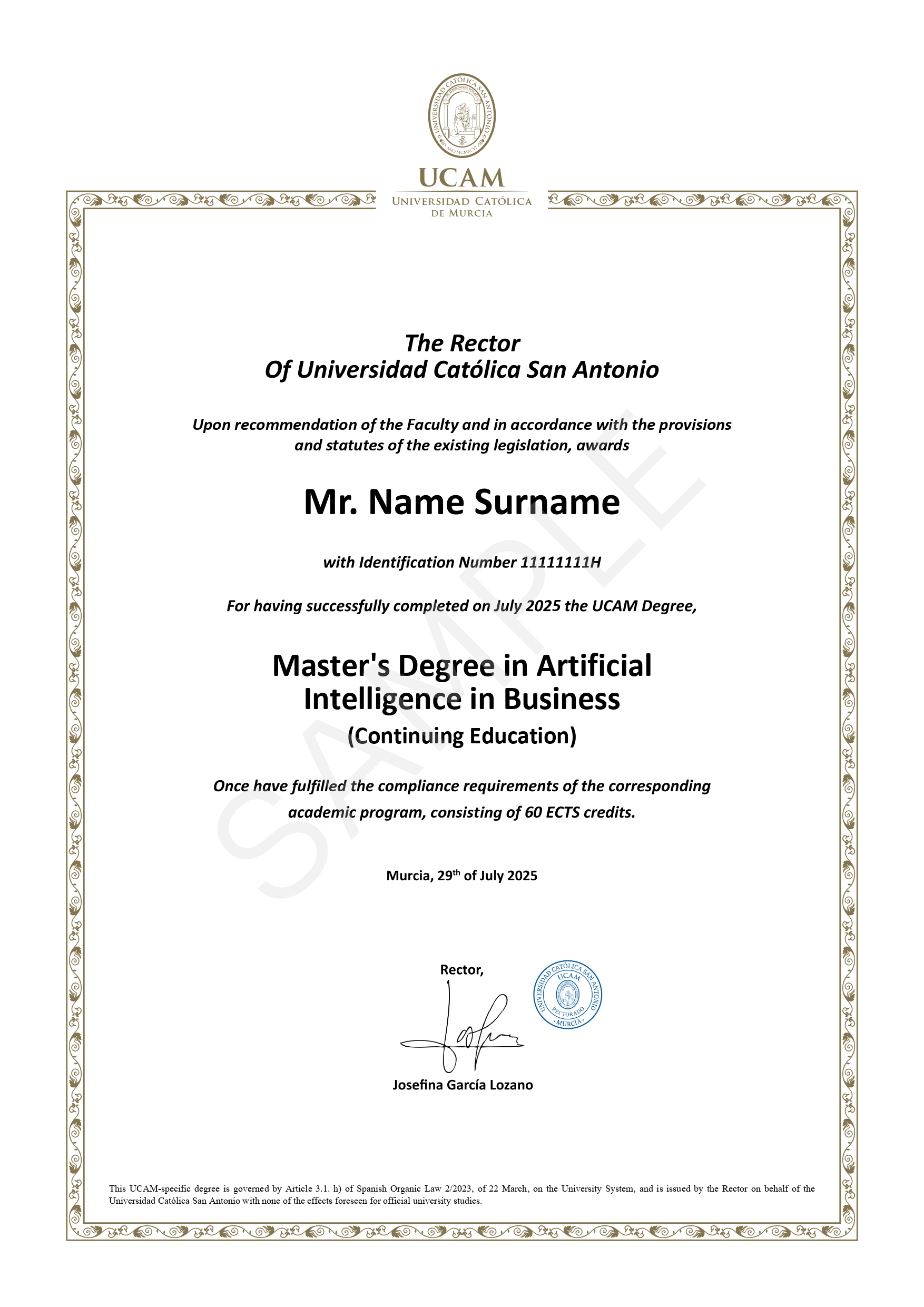

Master’s Degree in Artificial Intelligence in Business (Continuing Education)

Transform your business leadership with our comprehensive 12-month Master’s Degree program in Artificial Intelligence, certified by UCAM University. This professional development program equips you with cutting-edge AI skills for modern business applications, covering data analytics, machine learning, and strategic AI implementation through 200 hours of live instructor-led training.

- Duration
12 Months
- Modules
7 Modules
- Assignments
6 Assignments
- Format
Blended Learning
- Projects
3 Projects
- Level
Intermediate
Globally Recognized & Accredited:




Students Trained Globally
Industry-Aligned Programs
Countries with Active Alumni
Career Transition Success
- Industry-Standard Technology Stack
Tools & Technologies That Power Success
Master the complete data science ecosystem with hands-on experience using industry-leading tools and frameworks. Our Advanced Program in Data Science equips you with practical skills in Python programming, data manipulation, visualization, and machine learning – preparing you for real-world data challenges.
- Production-Ready Skills
- Industry-Relevant Tools
- Hands-On Learning
Python

MySQL

Anaconda

Jupyter Hub
Pandas
NumPy
Seaborn
Matplotlib
Excel
GIT

Tableau

Power Bi
- Industry-Standard Technology Stack
Tools & Technologies That Power Success
Master the complete artificial intelligence ecosystem with hands-on experience using industry-leading tools and frameworks. Our Master of AI in Business program equips you with practical skills in Python programming, data analytics, machine learning, and business intelligence – preparing you for real-world AI challenges.
- Production-Ready Skills
- Industry-Relevant Tools
- Hands-On Learning
Python

MySQL

Anaconda

Jupyter Hub
Pandas
NumPy
Seaborn
Matplotlib
Excel
GIT

Tableau

Power Bi
Universidad Católica de Murcia, Masters Degree
Universidad Católica de Murcia (UCAM), founded in 1996, is a fully-accredited European University based out of Murcia, Spain. With learning centres in the Middle East and Southeast Asia, UCAM aims to provide students with the knowledge and skills to serve society and contribute to the further expansion of human knowledge through research and development. The university offers various courses, including 30 official bachelor’s degrees, 30 master’s degrees and ten technical higher education qualifications through its Higher Vocational Training Institute, in addition to its in-house qualifications and language courses. The programmes offered are distinguished in Europe and worldwide, with good graduate employability prospects as well. UCAM is accredited by ANECA (National Agency for Quality Assessment and Accreditation of Spain) and the Ministry of Education regarding 17 of its undergraduate degrees.

Eligibility
Prerequisites
Course Modules
Python Basics and Core Concepts
Begin your journey with Python by setting up your environment and exploring basic syntax. Learn variables, data types, and operators—essential tools for writing structured and efficient code for data-driven applications.
Data Structures and Flow Control
Understand lists, tuples, and dictionaries, along with conditional statements, loops, and functions. Build control flow logic that enhances how your programs manage and manipulate data efficiently.
Mathematical Thinking & Library Essentials
Dive into core math concepts like number theory, vectors, and matrices. Work with libraries like NumPy for numerical computing, Pandas for data transformation, and Matplotlib for data visualization—foundational for analytical programming.


Learning Outcomes
By completing this module, you will:
- Understand Python syntax, variables, data types, and operators
- Apply lists, tuples, dictionaries, loops, and conditionals to real-world data
- Build and use Python functions to write modular and reusable code
- Integrate mathematical logic to solve complex problems using Python
- Use NumPy, Pandas, and Matplotlib for data computation and visualization
- Analyze data with statistics, probability, and correlation techniques
- Explain core programming and analytical patterns used in data science
Excel Basics and Spreadsheet Modeling
Learn the foundations of Excel—from creating and managing workbooks to formatting, formulas, and functions. Understand how to organize and model data using spreadsheet logic, cell referencing, and pivot tables.
Decision Models and Data Analysis Tools
Explore analytical methods like decision analysis, payoff tables, and decision trees. Learn to translate business problems into spreadsheet-based models for deeper insights and accurate decision-making.
Power BI for Business Insights
Use Microsoft Power BI to analyze, model, and visualize data. Build interactive dashboards and reports that support business decisions through advanced visualization and predictive analytics tools.


Learning Outcomes
By completing this module, you will:
- Understand the importance of visualizing data in business analysis
- Apply Excel tools to model data and choose suitable visual representations
- Build and use Python functions to write modular and reusable code
- Create dashboards and reports using Excel and Power BI features
- Use data visualization to extract insights that guide decision-making
- Prepare and analyze data for meaningful reporting and forecasting
- Work with spreadsheets, formulas, cell referencing, and pivot tables
- Demonstrate fluency with Power BI to manage and present data effectively
Introduction to Data Mining and EDA
Learn how to design, create, and manage databases to securely store and retrieve large datasets. Dive into exploratory data analysis (EDA) techniques to identify trends and patterns in structured and unstructured data.
Preprocessing and Data Cleaning Essentials
Understand the significance of cleaning and transforming raw data by removing duplicates, handling missing values, and correcting errors. Gain practical experience in preparing high-quality datasets for analysis.
Pattern Discovery and Clustering Techniques
Explore advanced pattern discovery methods including frequent itemsets, sequence patterns, and clustering. Learn to classify data and uncover insights that drive smarter business decisions.


Learning Outcomes
By completing this module, you will:
- Understand the role of EDA, data mining, and database handling in analytics
- Apply preprocessing techniques to clean, correct, and prepare data efficiently
- Manage both numerical and text-based data for high-quality analysis
- Use NumPy, Pandas, and Matplotlib for structured data exploration
- Gain hands-on experience with scikit-learn for clustering and classification
- Detect patterns in datasets using scalable data mining methods
- Build foundational skills for real-world business analytics projects
Introduction to AI and ML Fundamentals
Get a solid grasp of Artificial Intelligence and Machine Learning. Learn how machines can analyze data and improve performance without explicit programming, and understand the ethical concerns and career opportunities in AI.
Supervised and Unsupervised Algorithms
Dive into key machine learning types—supervised and unsupervised learning. Explore algorithms like regression, decision trees, random forests, k-NN, and clustering, while understanding when and how to apply each.
Practical Modeling and Evaluation
Understand dataset preparation, model selection, and evaluation. Learn to apply metrics like F1-score, accuracy, and precision to assess performance. Gain hands-on experience through industry-based projects.


Learning Outcomes
By completing this module, you will:
- Understand key AI concepts and the structure of ML systems
- Explore supervised and unsupervised learning algorithms
- Prepare and process data for training machine learning models
- Evaluate models using standard performance metrics
- Implement core ML algorithms like regression, decision trees, and random forest
- Demonstrate a clear understanding of the mathematics behind ML decisions
- Work on an industry-based ML project for practical exposure
Foundations of Operations Management
Understand the fundamental principles of operations management and how they impact productivity, efficiency, and decision-making across organizations. Learn about strategic planning, corporate objectives, and key functions.
AI Integration Across Operational Systems
Explore how AI transforms traditional operations—optimizing demand forecasting, inventory management, and supply chain workflows. Learn to integrate AI across industries like healthcare, manufacturing, and retail.
Strategic Planning and Real-World Application
Discover how to implement business and operational strategies using AI. Analyze case studies and examine how organizations are reshaping global and domestic operations through intelligent technologies.


Learning Outcomes
By completing this specialization, you will:
- Understand the principles of operations management and how AI enhances process optimization
- Explore AI applications in quality control, maintenance, and workflow automation
- Analyze global and regional strategies for operations in a digital-first environment
- Implement operational strategies using real-world case studies and AI-driven models
- Develop a comprehensive view of strategic, business, and corporate-level planning
Global HR Fundamentals and Cross-Cultural Dynamics
Explore the principles and practices of international HR management, including talent development, global workforce planning, and navigating diverse cultural and legal environments. Understand how organizational change and learning strategies support effective HRD initiatives.
AI in Human Capital Strategies
Discover how AI is transforming HR functions like recruitment, retention, and performance management. Learn to implement predictive analytics, AI-based hiring platforms, and employee engagement tools that enhance strategic workforce planning.
Ethics and Diversity in the AI-Driven Workplace
Examine ethical and regulatory implications of AI in HR. Understand how to build inclusive, responsible, and diverse work environments using AI, while maintaining compliance across international labor systems.


Learning Outcomes
By completing this specialization, you will:
- Understand how AI is reshaping international HR practices across global organizations
- Explore the use of AI in talent acquisition, diversity, inclusion, and engagement strategies
- Analyze the ethical, legal, and cultural challenges of AI implementation in HR
- Develop strategic AI-enabled HRD plans to manage a culturally diverse workforce
- Apply theories of organizational change and learning to global HR contexts
- Evaluate HRD initiatives and their outcomes in multinational environments through case studies
Real-World Application of Skills
This final capstone project challenges students to integrate and apply their knowledge of data science and analytics to solve a real-world industry problem. It simulates the end-to-end process of a business decision-making scenario using real data—from identifying a problem to delivering actionable insights.
Data-Driven Business Decision Making
Students will work on formulating a practical business problem, collecting relevant data, performing exploratory analysis, building visualizations, and applying AI or machine learning techniques to derive predictions and insights that support decision-making.
Cross-Functional Communication
In addition to technical execution, students will focus on presenting their results clearly and persuasively, tailoring their communication to both technical stakeholders and business leaders.


Learning Outcomes
Over the course of this capstone, you will:
- Identify and formulate a real-world business problem suitable for data-driven analysis
- Gather, clean, and preprocess data to ensure quality and relevance
- Conduct exploratory data analysis (EDA) to uncover trends, outliers, and insights
- Build effective data visualizations to support decision-making
- Apply machine learning algorithms for prediction, classification, or recommendation
- Evaluate the model’s performance and the impact of the solution
- Communicate findings and solutions to technical and non-technical audiences with clarity
Your Success Story Starts Here
Every image here tells a story of transformation, dedication, and success. Be the next to wear the cap and gown. Enroll today, and let your journey begin.
What Our Students Say
Every student has a story—of ambition, of challenge, of growth. In their own words, they share how Airtics became a turning point in their learning journey and helped them move closer to their goals.
Pemsith Ravi

- Verified Review
Zeeshan Ali

Airtics offers a truly transformative learning experience. The course content is up-to-date, the mentors are incredibly supportive, and the flexibility of the online platform made it easy to balance with my work. Highly recommended for anyone looking to upskill!
- Verified Review
Aalaa Shbair

The experience at Airtics College has been tremendous for me. It has illuminated my path and opened the way for me to become a developer of solutions in my workplace. I cherish every moment of this online learning experience and the supportive community of instructors and peers.
- Verified Review
Muhammad Fatouh

Airtics offered a great platform that allowed me to take a meaningful step forward in data science while balancing my demanding job as a telecom engineer. If you have a busy schedule and struggle with work-life balance, I encourage you to find a flexible platform like Airtics to pursue your goals.
- Verified Review
Al Tayyab Bakhsh

Coming from a non-technical background in marketing, switching to data science was challenging. The faculty at Airtics was incredibly helpful, especially my mentor Miss Piyali, who guided me with patience every step of the way. Their mentorship gave me the confidence to succeed.
- Verified Review
Dilnawaz Qureshi

Airtics provides an impressive curriculum for Python Full Stack development that is both well-structured and up-to-date. This comprehensive approach ensures we acquire a thorough understanding of the field and are well-prepared for real-world challenges.
- Verified Review
Charuhaas Shenoy

- Verified Review
Madonna Ghanem

The resources provided by Airtics for AI and ML students are top-notch. The institute has a well-equipped virtual lab with the latest software, allowing us to experiment with complex algorithms. The online library offers a wide range of reference materials and research papers.
- Verified Review
Dhruv Narse

Airtics provides a conducive learning environment for data analytics students. They have experienced faculty, and provide access to the latest software and tools used in the industry. This ensures that we are well-prepared for our future careers in the field.
- Verified Review
What Our Students Say
Every student has a story—of ambition, of challenge, of growth. In their own words, they share how Airtics became a turning point in their learning journey and helped them move closer to their goals.
Pemsith Ravi

- Verified Review
Zeeshan Ali

Airtics offers a truly transformative learning experience. The course content is up-to-date, the mentors are incredibly supportive, and the flexibility of the online platform made it easy to balance with my work. Highly recommended for anyone looking to upskill!
- Verified Review
Aalaa Shbair

The experience at Airtics College has been tremendous for me. It has illuminated my path and opened the way for me to become a developer of solutions in my workplace. I cherish every moment of this online learning experience and the supportive community of instructors and peers.
- Verified Review
Muhammad Fatouh

Airtics offered a great platform that allowed me to take a meaningful step forward in data science while balancing my demanding job as a telecom engineer. If you have a busy schedule and struggle with work-life balance, I encourage you to find a flexible platform like Airtics to pursue your goals.
- Verified Review
Al Tayyab Bakhsh

Coming from a non-technical background in marketing, switching to data science was challenging. The faculty at Airtics was incredibly helpful, especially my mentor Miss Piyali, who guided me with patience every step of the way. Their mentorship gave me the confidence to succeed.
- Verified Review
Dilnawaz Qureshi

Airtics provides an impressive curriculum for Python Full Stack development that is both well-structured and up-to-date. This comprehensive approach ensures we acquire a thorough understanding of the field and are well-prepared for real-world challenges.
- Verified Review
Charuhaas Shenoy

- Verified Review
Madonna Ghanem

- Verified Review
Dhruv Narse

Airtics provides a conducive learning environment for data analytics students. They have experienced faculty, and provide access to the latest software and tools used in the industry. This ensures that we are well-prepared for our future careers in the field.
- Verified Review
Real-World Capstone Projects
Apply your AI expertise to solve authentic business challenges through industry-based capstone projects. Collaborate with business mentors to identify problems, collect data, implement AI solutions, and measure impact. These projects form your professional portfolio, demonstrating practical skills to future employers and industry partners.
Customer Lifetime Value Prediction
Build a machine learning model to predict customer lifetime value using behavioral data, purchase history, and demographic analysis for strategic business decisions.
Computer Vision for Retail
Marketing Spend Optimization
Learn from Industry Leaders & Experts
Learn from the best in the field. Our faculty combines academic brilliance with industry expertise, featuring PhD holders, senior data scientists, and AI researchers from top organizations.
Global Student Community
Students from 60+ Countries Worldwide









Frequently Asked Questions
All live sessions are recorded and available through our Learning Management System (LMS). You can access missed classes anytime and review course materials at your convenience. Our flexible learning format accommodates working professionals with busy schedules, ensuring you never fall behind.
This program specifically focuses on artificial intelligence applications in business strategy, operations, and decision-making. Unlike traditional MBAs, you’ll learn hands-on AI tools like Python, machine learning algorithms, and data visualization platforms while developing strategic business acumen for the AI-driven economy.
You’ll complete 7 comprehensive modules covering data science, machine learning, operations management with AI, and international HR management with AI. The program includes 200 hours of live training, 6 assignments, 3 industry-based projects, and a capstone project with real business applications.
Graduates pursue roles as AI Business Analysts, Data Science Managers, AI Strategy Consultants, Business Intelligence Directors, Digital Transformation Leaders, and AI Project Managers. Our 94% placement success rate demonstrates strong industry demand for AI-skilled business professionals.
Assignments are module-specific exercises that reinforce learning concepts. The capstone project is a comprehensive, industry-based challenge where you collaborate with business mentors to solve real-world problems, applying all program knowledge to create a portfolio-worthy solution that demonstrates your expertise to employers.
Still have questions?
If you have any other questions or need further information about our Master of Artificial Intelligence in Business program, don’t hesitate to contact us. Our admissions team is here to help you take the next step in your AI career journey.


















